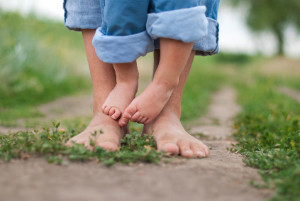
Drexel Hill (484) 521-0233
West Chester (610) 436-5883

Drexel Hill (484) 521-0233
West Chester (610) 436-5883
 Having your child play on the playground barefooted may be a good idea, according to some podiatrists and parenting experts. Its proposed benefits include proper foot function, foot development, better balance, and proprioception, which is how the body senses movement. Parents are recommended to try it themselves. Proponents point to studies that show how it strengthens the feet and legs, determining that people are less likely to suffer from conditions like bunions or corns. Going barefoot is still a debated topic and has its own pros and cons. If you or your child going barefoot interests you, be sure to check with a podiatrist to see if it's right for both of you.
Having your child play on the playground barefooted may be a good idea, according to some podiatrists and parenting experts. Its proposed benefits include proper foot function, foot development, better balance, and proprioception, which is how the body senses movement. Parents are recommended to try it themselves. Proponents point to studies that show how it strengthens the feet and legs, determining that people are less likely to suffer from conditions like bunions or corns. Going barefoot is still a debated topic and has its own pros and cons. If you or your child going barefoot interests you, be sure to check with a podiatrist to see if it's right for both of you.
Barefoot running has its own share of benefits and disadvantages. If you have any concerns about your feet or ankles, contact the podiatrists from Dr. Siegerman & Associates. Our doctors will treat your foot and ankle needs.
Barefoot Running
The Impact of Barefoot Running
The Advantages of Barefoot Running
The Drawbacks of Barefoot Running
So, what can runners do to make barefoot running safe? It’s best to make a slow transition from running shoes to barefoot running. Once the feet begin to adjust, try walking, then jogging and gradually increasing the distance. Minimalist running shoes may also be an option.
If you have any questions please feel free to contact one of one of our offices located in Drexel Hill and West Chester, PA . We offer the newest diagnostic and treatment technologies for all your foot and ankle needs.
Request a free copy of
Laser Away Foot Pain!
today.
